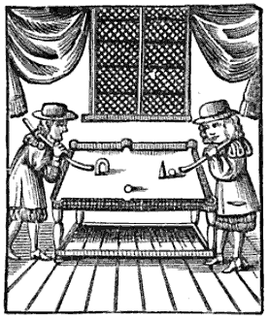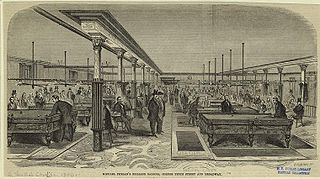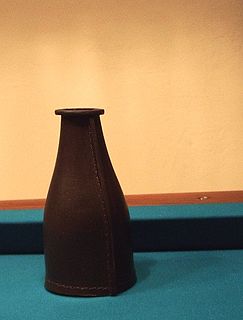BCA Hall of Fame
| | This section needs expansion. You can help by adding to it. (February 2010) |
The Billiard Congress of America (BCA) is a governing body for cue sports in North America (here defined as the United States and Canada exclusively), the regional member organization of the World Pool-Billiard Association (WPA). [1] It was established under this name in 1948 [2] as a non-profit trade organization [3] in order to promote the sport and organize its players via tournaments at various levels. The BCA is headquartered in Broomfield, Colorado. [4] [5] The voting members of the organization are mostly equipment manufacturers. [6]
The BCA publishes an annual rule and record book that incorporates the WPA world standardized rules for games such as nine-ball, eight-ball, and straight pool, as well as rules for other games that are not presently the subject of international competition, such as cowboy pool, rotation, American snooker, and Chicago among many others. The BCA holds an annual trade show, the International Billiards & Home Recreation Expo. Also annually, it inducts great players, and those who have made great contributions to the sport, into the BCA Hall of Fame.
The origins of the BCA began with the National Billiard Association of America (NBAA), founded July 25, 1921. The organization rapidly became the de facto governing body of the sport in the United States, with 35,000 members by 1928, and was closely tied to the Brunswick-Balke-Collender company, a major equipment manufacturer. After a decline in influence in the late 1930s, in part owing to a dispute with world carom billiards champion Willie Hoppe, the NBAA reformed in 1941 as the Billiard Association of America (BAA). [7] [8] Headquartered in Chicago, Illinois, and calling itself "the Governing Body of Billiards", the BAA produced a concise, portable, inexpensive rulebook of carom and pool games that was to serve as the model for future BCA releases. [8] The BAA in turn became the BCA in 1947. [6] [9] The BCA formed with, and for several years shared offices with, the promotional trade association National Billiard Council (NBC), now defunct. [9] [10] Early BCA rulebooks were essentially identical to the 1946 BAA edition, including the cover art and the absence of the increasingly popular game nine-ball from the ruleset. [8] [11] (Nine-ball did not appear until the 1967 edition. [12] ) The BCA rulebooks have remained in near-annual continuous publication to the present day.
In 2000, the BCA made the major move of adopting the World Pool-Billiard Association's standardized rules for eight-ball, nine-ball, and other games subject to international professional competition. The BCA had by this time become the national affiliate of the WPA. In the new edition of the rules, the organization expressed a commitment to seeing pool and carom billiards become Olympic sports (and in fact selected Colorado Springs for its new headquarters for proximity to the US Olympic Committee). [13] The rules changes have not been without controversy, as some of them upset US player expectations; various leagues have ignored the new rules and continued with traditional US rules (e.g., in the game of eight-ball, legally pocketing the 8 ball on the break shot has commonly been treated as an instant win).[ citation needed ]
| | This section needs expansion. You can help by adding to it. (February 2010) |
The BCA's annual Billiard Expo (as it is known for short, or simply the Expo, within the industry [14] ) is the largest mostly-cue-sports trade convention in the world,[ citation needed ] and despite its broad name is primarily focused on pool (pocket billiards). It has been held in various locations, most frequently Las Vegas, Nevada, since its founding in 1984. [14] The Expo is exclusively sponsored by the BCA (and its members), [3] [5] and is managed by William T. Glasgow, Inc. of Orland Park, Illinois. [5] [15] The expressed purpose of the event is to "provide industry manufacturers, distributors, retailers, dealers and poolroom operators an annual venue for new business opportunities, including education, new products and networking." [3] Vendor attendance in 2006 was nearly 300 companies filling between 1,300 and 1,400 10 sq ft (0.93 m2) booth spaces. [14] [16] The June 25–27, 2009 event at the Sands Expo and Convention Center in Las Vegas saw 116 exhibitor in 412 booth spaces, with 1,120 buy attendees. [17] The next event will be held June 14 (Wednesday) through 16 (Friday), 2010, at the Las Vegas Convention Center, [3] with registration for attendees opening February 15. [5] These were not the original dates, and some debate surrounded the matter, with the dates being finalized only as late as September 2009, and chosen to ensure maximum attendance by billiard entrepreneurs, most of whom have business peaks on weekends. [3] By the end of the 2009 Expo, 65 companies had already contracted for 326 booth spaces at the 2010 Expo. [3]
The vast majority of attendees are industry insiders, rather than players. In 2006, 94% were billiard retailers, 5% billiard hall operators, and 1% "other" (e.g. bowling and amusement center operators). [14] In 2009, only 70% were retailers. [5] In that year, 83% were from the United States and 7% from Canada, with the remaining 10% being from elsewhere around the world. [5] Despite operators not being in the majority, the event is geared toward them, with "Business of Billiards" seminars on successful hall operation, [5] [14] and exhibitors principally in the business of supplying such venues. Exhibiting vendors typically include product lines such as pool equipment (tables, cues, racks, chalk, etc.), billiards-themed apparel and accessories, instructional materials, bar and billiard furniture and furnishings (stools, neon signs, juke boxes, etc.), business services (food processing, point-of-sale computer systems, etc.), other commercial gaming equipment (darts, table shuffleboard, foosball, video games, pinball machines, etc.), plus assorted home recreation categories (poker, home spas and pools, tanning beds, sound systems, outdoors equipment, etc.), and billiard-related services such as cue repair. [14] [16] The BCA claims that, as of 2009, 55% of attendees make purchasing decisions for their businesses, 50% buy there, and 20% more buy within one month of the show. [5] [15]
While Las Vegas is the most frequent host city for the event, it has also been held in Charlotte, North Carolina, Houston, Texas, Baltimore, Maryland, New Orleans, Louisiana, Kansas City, Missouri, Orlando, Florida, Minneapolis, Minnesota, Nashville, Tennessee, Louisville, Kentucky, and Ft. Worth, Texas. [14]
As of the 2010 event, the cost per 10 sq ft (0.93 m2) exhibitor booth varied from US$1,350 to $1,800 depending upon BCA membership status. The event ticket price was $100 for non-exhibitors and non-members. [15] These prices were up from $1,200 and $50, respectively, in 2007. [14]
The BCA Pool League (BCAPL) is one of the major amateur pool leagues in the United States and is present in over a dozen other countries outside the U.S., with a significant presence in Canada. Originally operated by the BCA, since 2004 the BCAPL has been owned and operated by billiards event promoter CueSports International (CSI) of Henderson, Nevada.
The BCA Pool League has approximately 450 local leagues with 60,000+ members. Leagues are played on both bar-size 7-foot (2.1 m) and regulation 9-foot (2.7 m) tables. Beginning in the 2009/2010 season, CSI introduced a second league, the USA Pool League (USAPL), aimed at a more casual player. Both the BCAPL and USAPL (who share a rulebook) use BCA rules, with the addition of wheelchair rules, team play adaptations, and "Applied Rulings" from years of large-scale tournament administration.
The US Collegiate Pocket Billiards National Championship, organized by the Association of College Unions International (ACUI) since 1937, with separate men's and women's divisions since 1939, is recognized and supported by the BCA. The amateur tournament's annual champions are listed in the BCA's Billiards: The Official Rules and Records Book.
The United States Billiard Media Association (USBmA) was organized in January 2007 [18] to elect "billiard media members to the Billiard Congress of America's Hall of Fame Board". [18] This media-focused suborganization also lists other goals in its materials, including "elevating the visibility and status of billiards in the media at large" as well as various member-support functions. [18] Membership is strictly limited to "professional print, radio, TV, public relations and Internet media persons who cover cue sports", as determined by the USBmA executive board. [18] As of February 2010, the group listed 33 members, including most of the better-known names in US-based cue sports publishing. [18] USBmA is nominally based in Chicago, Illinois at the same address as Billiards Digest (Luby Publishing). [18]

Cue sports, also known as billiard sports, are a wide variety of games of skill generally played with a cue stick, which is used to strike billiard balls and thereby cause them to move around a cloth-covered billiards table bounded by elastic bumpers known as cushions.

Eight-ball is a pool billiards played on a billiard table with six pockets, cue sticks, and sixteen billiard balls: a cue ball and fifteen object balls. The object balls include seven solid-colored balls numbered 1 through 7, seven striped balls numbered 9 through 15, and the black 8 ball. After the balls are scattered with a break shot, a player is assigned either the group of solid or striped balls once they have legally pocketed a ball from that group. The object of the game is to legally pocket the 8-ball in a "called" pocket, which can only be done after all of the balls from a player's assigned group have been cleared from the table.

Nine-ball is a discipline of the cue sport pool. The game's origins are traceable to the 1920s in the United States. It is played on a rectangular billiard table with pockets at each of the four corners and in the middle of each long side. Using a cue stick, players must strike the white cue ball to pocket nine colored billiard balls, hitting them in ascending numerical order. An individual game is won by the player pocketing the 9-ball. Matches are usually played as a race to a set number of racks, with the player who reaches the set number winning the match.

English billiards, called simply billiards in the United Kingdom and in many former British colonies, is a cue sport that combines the aspects of carom billiards and pool. Two cue balls and a red object ball are used. Each player or team uses a different cue ball. It is played on a billiards table with the same dimensions as one used for snooker and points are scored for cannons and pocketing the balls. English billiards has also, but less frequently, been referred to as "the English game", "the all-in game" and (formerly) "the common game".

Straight pool, which is also called 14.1 continuous and 14.1 rack, is a cue sport in which two competing players attempt to pot as many billiard balls as possible without playing a foul. The game, which is played on a billiard table, is the primary version of pool that was played in professional competition until it was superseded by faster-playing games like nine-ball and eight-ball in the 1970s.

A billiard ball is a small, hard ball used in cue sports, such as carom billiards, pool, and snooker. The number, type, diameter, color, and pattern of the balls differ depending upon the specific game being played. Various particular ball properties such as hardness, friction coefficient and, resilience are important to accuracy.

Straight rail, also called straight billiards, three-ball billiards, or the free game, is a discipline of carom billiards that is the most basic form of the game. The game is played on a pocketless unmarked billiard table, usually 10 by 5 feet in size, and three billiard balls, one, usually white, that serves as the cue ball for the first player, a second cue ball for the second player, and an object ball, usually red. The object of the game is to score points by striking the player's assigned cue ball with a cue stick so it makes contact with both the opponent's cue ball and the object ball in the same stroke, known as a carom. Games are played to a predetermined number of points.

A billiard table or billiards table is a bounded table on which cue sports are played. In the modern era, all billiards tables provide a flat surface usually made of quarried slate, that is covered with cloth, and surrounded by vulcanized rubber cushions, with the whole thing elevated above the floor. More specific terms are used for specific sports, such as snooker table and pool table, and different-sized billiard balls are used on these table types. An obsolete term is billiard board, used in the 16th and 17th centuries.

Pool is a classification of cue sports played on a table with six pockets along the rails, into which balls are deposited. Each specific pool game has its own name; some of the better-known include eight-ball, blackball, nine-ball, ten-ball, seven-ball, straight pool, one-pocket, and bank pool.

Alfredo de Oro was a Cuban professional carom billiards and pool player who several times held the world title in both three-cushion billiards and straight pool simultaneously. He was posthumously inducted into the Billiard Congress of America's Hall of Fame in 1967, one of the very few non-Americans to receive the honor. He was ranked number 4 on the Billiards Digest 50 Greatest Players of the Century.
Cowboy pool is a hybrid pool game combining elements of English billiards through an intermediary game, with more standard pocket billiards characteristics. The game employs four balls, the cue ball and three others, numbered one, three, and five. A game of Cowboy pool is contested as a race to 101 points, with those points being awarded for a host of different shot types. Dating back to 1908, the game is a strictly amateur pastime.

The World Pool-Billiard Association (WPA) is the international governing body for pool. It was formed in 1987, and was initially headed by a provisional board of directors consisting of representatives from Japan, the United States, Sweden, and Germany. as of February 2019, the WPA president is Ian Anderson of Australia. It is an associate of the World Confederation of Billiards Sports (WCBS), the international umbrella organization that encompasses the major cue sports.
Honolulu, is a pocket billiards game. Also known as banks, kisses and combinations, or as indirect, players must pocket all shots in an indirect fashion to reach a set number of points. According to the Billiard Congress of America, the governing body for billiards in the United States, Honolulu presents players with "an unending kaleidoscope of strategic and shot-making challenges."

Bottle pool, also known as bottle-billiards and bottle pocket billiards, is a hybrid billiards game combining aspects of both carom billiards and pocket billiards. Played on a standard pool table, the game uses just two object balls, a cue ball, and a 6¾ inch (171 mm) tall, narrow-necked bottle called a shake bottle or tally bottle, traditionally made from leather, that is placed on the table and used as a target for caroms. Those unfamiliar with the game sometimes mistakenly use its name as a synonym for the very different game of kelly pool. Bottle pool has been described as combining "elements of billiards, straight pool and chess under a set of rules that lavishly rewards strategic shot making and punishes mistakes with Sisyphean point reversals."

Cribbage, sometimes called cribbage pool, fifteen points and pair pool, is a two-player pool game that, like its namesake card game, has a scoring system which awards points for pairing groups of balls that total 15. Played on a standard pool table, participants who pocket a ball of a particular number are required to immediately pocket the companion ball that tallies to 15 when added to the prior ball's number. Each pair so pocketed counts as a cribbage; there are seven such pairs, and the 15 ball counts as an eighth by itself after all of the others have been pocketed. The first player to score five cribbages wins the game.

Blackball pool, also known as English pool, English eight-ball or simply reds and yellows, is a pool game originating in the United Kingdom and popularized across Europe and The Commonwealth, such as Australia and South Africa. In the UK and Ireland it is usually called simply "pool". The game is played with sixteen balls on a small pool table with six pockets.
Carom billiards and pool are two types of cue sports or billiards-family games, which as a general class are played with a stick called a cue which is used to strike billiard balls, moving them around a cloth-covered billiard table bounded by rubber cushions attached to the confining rails of the table.
American snooker is a cue sport played almost exclusively in the United States, and strictly on a recreational, amateur basis. Diverging from the original game of snooker, rules for American snooker date back to at least 1925, and have been promulgated by the Billiard Congress of America (BCA) since the mid-20th century. The game is in decline, as the standardized international rules have largely supplanted it.
The ACUI Collegiate Pocket Billiards National Championship, in recent years known more specifically as the ACUI Collegiate Nine-ball National Championship, was an amateur United States annual pool competition for university and college students, organized by the Association of College Unions International (ACUI). It was founded in 1937, and was one of ACUI's longest-running programs. In June of 2020, the ACUI made the decision to discontinue their National Collegiate Pocket Billiards program.

Fifteen-ball pool, also known as sixty-one pool, is a pocket billiards game developed in America in the nineteenth century from pyramid pool. Created by members of the Bassford's Billiard & Chess Rooms in Manhattan during the late 1830s or 1840s, it is the ancestor to many American pool games.